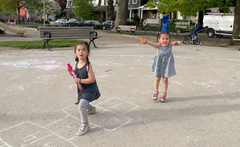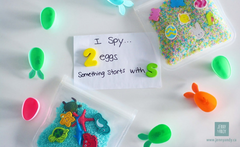
Some may argue that play doesn’t need to be defined, explained, or studied – people recognize play when they see it. Play is often seen as the opposite of work, something for the weekends, during vacations, or with children. But understanding the term play and its importance from an academic point of view is critically important to professionals like early childhood educators and therapists.

So, what is play?
As it turns out, play truly is the work of children. Playing is their occupation and it's crucial to learning and reaching developmental milestones.
According to Aistear: the Early Childhood Curriculum Framework’s Learning and developing through play, play has 10 characteristics: it can be active, risky, communicative, interactive, symbolic, or therapeutic, and is always meaningful, involved, voluntary, and enjoyable - learn more about the 10 characteristics of play.
Ultimately, play is how children learn about the world, each other, and themselves, and is as much a part of healthy development as eating nutritious meals and getting enough sleep. Because playing is inherently enjoyable, when children learn through play, they are learning in the optimal circumstance, one in which they are highly engaged and motivated.
Engage your child's development with Jenny & Andy's Organic Crinkle Toy!
How exactly do children learn through play?
Through play, children build important knowledge that encompasses all developmental domains, such as language development, cognitive development, and emotional development, just to name a few. Let's take a look at the role that playing can have in a child's development within these domains.
Language Development
Throughout the school years, children are constantly developing their language skills through play, as well as learning important roles that pertain to the real world.
For example, when children are engaged in playing “house” or “dress up,” they are often interacting with one another, which is important for language development while constantly applying and recalibrating their current knowledge about the real world.

Playing even fosters literacy and mathematics. Even in the earliest years, children become familiar with words by playing with books or other materials that have letters on them.
Check out Jenny & Andy's Positive Affirmation Cards For Kids!
Cognitive Development
Children at play are always exercising their cognitive abilities. When children play, they are constantly identifying problems, solving them, creating, experimenting, and thinking.
Encouraging your child to experiment and solve problems during play can be hugely beneficial. Rather than giving your child the solution right away, you can help guide your child through challenges by asking them questions and providing choices.
For example, if your child is having difficulty putting in a puzzle piece, guide them through the process: “Hmm, does the puzzle go this way, or that way? Let's try each way. Which way looks like it will fit?” Practicing this through play provides children the framework to better solve real-world problems in the future.

Emotional Development
Play is also children’s means of self-expression, which is important for their emotional development. While engaged in play, children feel safe and are able to express any part of themselves at that moment without worrying about reprisal.
Children learn how to express their feelings; they use play to relax tension and anxiety, release aggression, and express conflict.

Play plumps the brain!
Play actually physically impacts the brain by causing the prefrontal cortex to become bigger and faster. “The experience of play changes the connections of the neurons at the front end of your brain,” says Sergio Pellis (via NPR), a researcher at the University of Lethbridge in Alberta. “And without play experience, those neurons aren’t changed… So play is what prepares a young brain for life, love and even schoolwork,” he says.
The prefrontal cortex is the brain’s executive control centre. That’s where the brain regulates emotions, makes plans, and solves problems. So, researchers confirm that play is essential to healthy brain development.

The positive effects of play on young children are far-reaching—influencing all facets of their development. The benefits extend to adults as well. Talking about play with children shows them that adults are invested and respect their play decisions, fostering better connections between adults and children. In turn, respect, trust, and love lay the foundation for a child's mental and emotional well-being, self-confidence, and an emotional state that is conducive to nurturing the learning brain.
At Jenny & Andy, we aim to produce creative solutions for real world use by today's family – combining innovative design with sustainably sourced materials that are always safe for baby. Below are some Jenny & Andy toys that your little one will love to squeeze, squish, and learn with.
Organic Plush Rattle Cube
Our soft, Organic Plush Rattle Cubes stimulate tactile and auditory senses with its squish-ability and soft bell, and has an attractive high-contrast print to stimulate visual senses.
Organic Crinkle Toy
Our Organic Crinkle Toys stimulate the senses when you squeeze and grasp for a satisfying crunch. With a variety of colours and prints, there's something for everyone.
Shop the Jenny & Andy collection
About the author:
Sam is Jenny & Andy’s Marketing Coordinator. Before she joined Jenny & Andy, she was a speech therapy associate and behaviour therapist who spent 5 years working with young toddlers with autism and other exceptionalities and their families.
Her therapy sessions required her to work collaboratively with Speech-Language Pathologists, Board Certified Behaviour Therapists, Occupational Therapists, Teachers, and Registered Early Childhood Educators.
Sources:
-
Biddle, Gordon A. Kimberly, et al. (2013) Early Childhood Education Becoming a Professional. SAGE Publications Inc.
- Hamilton, Jon (2014). Scientists Say Child's Play Helps Build a Better Brain.
- National Council for Curriculum and Assessment. (2009a). Aistear: The Early Childhood Curriculum Framework, principle and themes.







